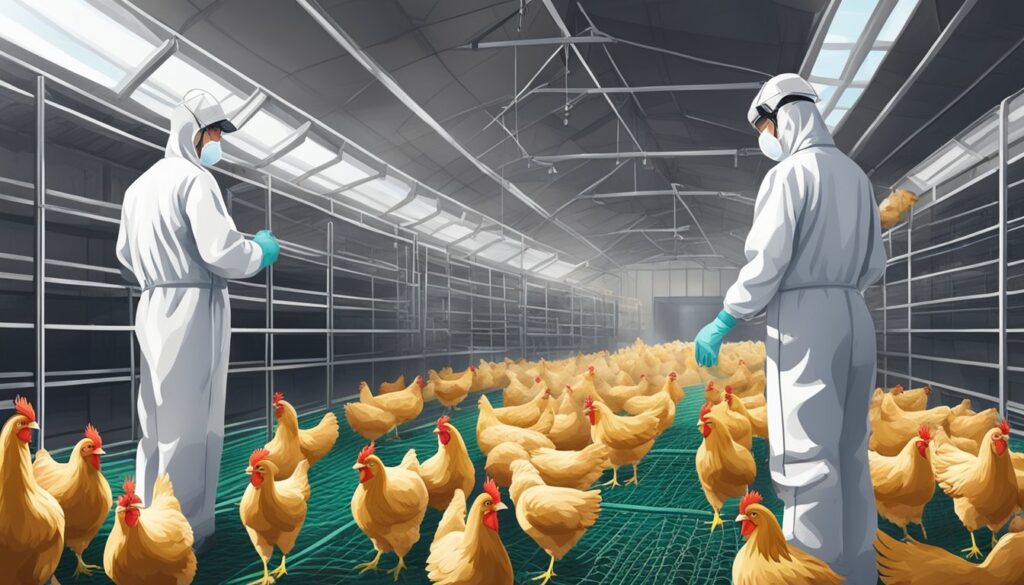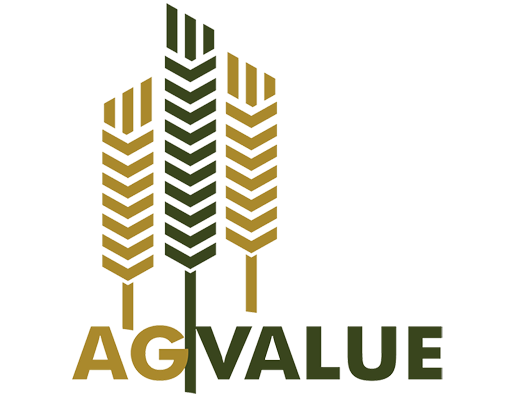
- AgValue Consulting
- June 7, 2024
- 12:01 pm
- 7 minutes
AgValue Consulting emphasizes the utmost importance of prioritizing biosecurity measures for poultry health, especially for farmers. Implementing strong biosecurity protocols is crucial for farmers to safeguard their poultry flocks from diseases, ensuring optimal production and minimal losses. By prioritizing biosecurity, poultry farmers can protect their livelihoods and investments, ultimately leading to sustainable farming practices and economic stability.
AgValue Consulting is a leading authority in poultry farm consulting, providing expert guidance and support to farmers in implementing effective biosecurity measures. With their specialized knowledge and experience in the field, AgValue Consulting assists farmers in enhancing their biosecurity protocols, ultimately leading to healthier flocks, increased productivity, and reduced costs associated with disease management. Farmers can rely on AgValue Consulting for comprehensive solutions tailored to their specific needs, ensuring the long-term success of their poultry operations.
Key Takeaways
- Biosecurity measures prevent the introduction and spread of diseases, ensuring the health of poultry.
- They safeguard the global food supply by preventing disease outbreaks that disrupt the poultry industry.
- Effective biosecurity boosts productivity, promoting economic stability in rural areas reliant on poultry farming.
- Strong biosecurity measures can prevent human health issues like disease outbreaks and antibiotic resistance.
- Regular review and customization of biosecurity strategies are essential for each unique poultry farm’s disease management.
Understanding Biosecurity Measures
Before diving into the specifics of biosecurity, it’s essential you grasp the general concept and importance of these measures for maintaining poultry health. Biosecurity, in simple terms, is a set of practices designed to prevent the introduction and spread of diseases in poultry. It’s not just about keeping diseases out, but also about managing diseases if they manage to breach your defences.
The effectiveness of biosecurity measures depends on your understanding and correct application. You can’t just set and forget. You need to regularly review and adjust your strategies as conditions change. Remember, every farm is unique; what works on one may not necessarily work on another.
It’s important to remember that your role in biosecurity doesn’t stop at your farm’s boundaries. You’re part of a wider community working together to protect the industry. This means sharing information with your neighbors, participating in industry initiatives, and supporting research.
Biosecurity isn’t just a box to tick; it’s a commitment to the health of your birds, the viability of your farm, and the sustainability of the poultry industry. To put it simply, biosecurity is a necessity, not an option.
Disease Prevention in Poultry
While you’re working hard to maintain biosecurity, it’s equally important to focus on disease prevention in your poultry. Implementing preventative measures goes a long way in keeping your flock healthy and productive, reducing the risk of disease spread that can cripple your operations.
Firstly, a strong vaccination program is essential. Vaccines stimulate the birds’ immune systems, enabling them to resist disease-causing organisms. Ensuring that your birds receive the correct vaccines at the appropriate times is key.
Secondly, proper hygiene and sanitation practices can’t be overstated. Regularly clean and disinfect the poultry housing and equipment. This includes the feeders, waterers, and nests. Remember, cleanliness wards off disease-causing pathogens.
Moreover, maintaining a balanced diet for your birds is crucial. Nutrient deficiencies can weaken their immune system, making them more susceptible to diseases. Provide them with a diet rich in proteins, vitamins, and minerals.
Lastly, regular health checks are essential. Monitor your flock for any signs of illness. Early detection and prompt treatment can prevent the spread of diseases.
Impact on Global Food Supply
Beyond maintaining the health of your poultry, these biosecurity and disease prevention measures also play a significant role in safeguarding our global food supply. Consider this: poultry meat is the second most widely eaten type of meat globally, and eggs are an essential source of high-quality protein for many people. If disease ravages a poultry population, it doesn’t just harm the animals and those who raise them; it can also disturb the food supply chain on a global scale.
Imagine if a serious outbreak occurred, and you’d to cull your birds to prevent disease spread. This wouldn’t just impact your farm; it could potentially influence the price and availability of poultry products worldwide, particularly if the disease reached pandemic levels. In some regions where alternative protein sources aren’t readily available, this could lead to significant nutritional challenges.
Biosecurity and Rural Economies
You mightn’t realize it, but strong biosecurity measures can be a game-changer for rural economies reliant on poultry farming. These economies often depend heavily on the success of their poultry farms, and any threat to the health of their birds can have devastating impacts.
Biosecurity measures provide several key benefits for these economies:
- *Boosted Productivity*: Healthy birds mean more eggs and meat, leading to higher yields and profits.
- *Minimized Costs*: Effective biosecurity reduces the need for expensive treatments and decreases losses from sick or deceased birds.
- *Stability*: By safeguarding against disease outbreaks, biosecurity measures provide a stable environment for farmers, securing their livelihoods and the local economy.
- *Enhanced Marketability*: Consumers are becoming more health-conscious and prefer products from farms with strict biosecurity measures.
- *Improved Sustainability*: Sustainable farming practices, including strong biosecurity, ensure the long-term viability of the poultry industry in these rural areas.
Human Health Implications
Ever considered how biosecurity in poultry farming directly affects your health? Poultry farms, if not properly maintained, can become breeding grounds for various diseases. Pathogens from these farms can contaminate the air, water, and even the food you consume.
You’ve probably heard of outbreaks like avian influenza or ‘bird flu.’ This deadly disease can jump from poultry to humans, leading to serious health issues. A strong biosecurity system helps prevent such outbreaks, safeguarding both poultry and people.
Another concern is antibiotic resistance. Overuse of antibiotics in poultry farming can lead to resistant strains of bacteria. You might think you’re safe because you don’t eat chicken, but resistant bacteria can spread beyond the farm. They can contaminate the environment, or be transferred to other animals and eventually to humans. This can turn a minor infection into a major health crisis.
In a nutshell, prioritizing biosecurity in poultry farming isn’t just about protecting the birds. It’s also about protecting you. The healthier our poultry farms are, the healthier our community is overall. Improve biosecurity measures today, and you’re investing in your health for tomorrow.
Enhancing Biosecurity: Future Steps
So, what can we do to enhance biosecurity in poultry farming for a safer future? You’ll be pleased to know that there are several measures you can take, all aimed at safeguarding your poultry’s health and, by extension, our global food supply chain.
Here are some steps you can consider:
- Invest in Staff Training: It’s vital to provide regular training to your workforce. They should be well-informed about the latest biosecurity practices and understand why they’re important.
- Implement Strict Access Controls: Limit access to your poultry houses. The fewer people and vehicles entering, the less chance of disease transmission.
- Maintain Cleanliness: Regular cleaning and disinfection of equipment and housing can significantly reduce the risk of disease outbreaks.
- Vaccination Programs: Vaccinations are an effective way to protect your flock from common diseases. It’s an investment worth making.
- Regular Vet Checks: Schedule routine veterinary checks. Early detection of any health issue can make a huge difference.
Frequently Asked Questions
What Are the Economic Implications of Biosecurity Measures for Individual Poultry Farmers?
You’ll save money in the long run with biosecurity measures. They prevent diseases, reducing poultry loss and vet costs. Healthy birds also produce more, boosting your profit. It’s an investment in your farm’s sustainability.
How Does the Implementation of Biosecurity Measures Impact the Cost and Pricing of Poultry Products?
By implementing biosecurity measures, you’re likely to increase costs, which can lead to higher pricing of poultry products. However, it’s a necessary expense to guarantee the health and safety of your flocks.
How Do Biosecurity Measures Affect Poultry Health and Productivity in Different Geographical Regions?
Biosecurity measures greatly enhance poultry health and productivity across different regions. They decrease disease incidence, improving output. However, effectiveness varies due to regional disease prevalence, climate, and implementation practices. So, it’s essential to tailor strategies accordingly.
Are There Specific Biosecurity Training Programs for Poultry Industry Workers?
Yes, there are specific biosecurity training programs. They equip you with knowledge and skills to prevent disease spread in poultry farms. You’ll learn about sanitation, controlling visitors’ access, and managing sick birds effectively.
What Are the Most Common Challenges in Implementing Biosecurity Measures at Large-Scale Poultry Farms?
You’re likely to face challenges like workers’ lack of knowledge, high costs of implementation, difficulty enforcing protocols at all times, and the scale of operations making it hard to monitor and control disease spread.
Conclusion
To effectively safeguard poultry health, prioritizing biosecurity measures is crucial. By implementing these measures, not only are you ensuring the well-being of your birds, but you’re also mitigating the risk of disease transmission, protecting the integrity of the global food supply chain, and bolstering rural economies. Furthermore, enhancing biosecurity measures is imperative for promoting human health and preventing potential zoonotic diseases.
For expert guidance on optimizing biosecurity measures and enhancing overall poultry health management, reach out to AgValue Consulting at 229-499-4534. Our team specializes in agricultural appraisal services and can provide tailored solutions to meet your specific needs.
Remember, investing in biosecurity isn’t just about the chickens—it’s about safeguarding the entire agricultural ecosystem. Trust AgValue Consulting to help you prioritize poultry health and ensure a sustainable future for your operations.
